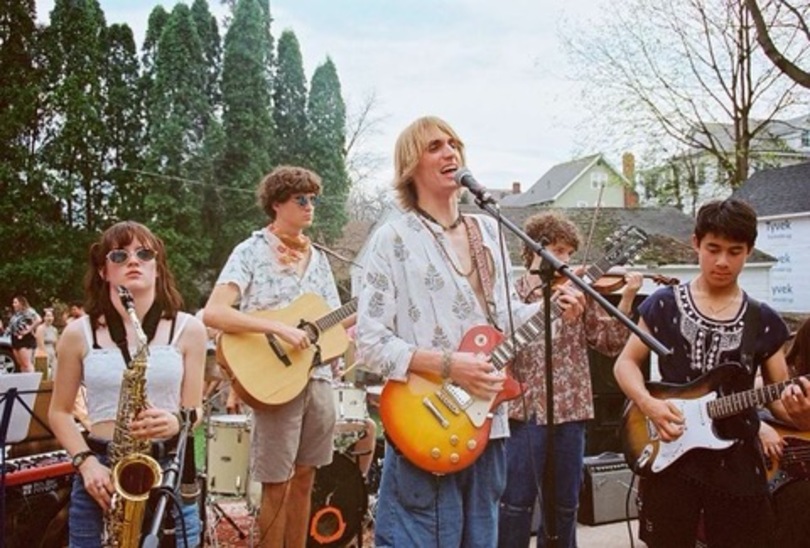Student band Polarded bends genres in the house show scene

Courtesy of Brendan Hird
Jordyn Marachin, James O’Connor, Brendan Hird, Jackson Springmann and Jonah Komosinski performing as the band Polarded at the music venue Mudpit. With its variety of performers and instruments, Polarded creates a new, expansive sound.
Get the latest Syracuse news delivered right to your inbox.
Subscribe to our newsletter here.
At their Redgate show this February, Polarded played Joy Division’s “New Dawn Fades,” bellowing out the melancholy epic in front of a crowd that likely wasn’t expecting ‘70s emo rock. Lead vocalist and guitarist Brendan Hird asked “how many of you guys liked Joy Division?,” then hollered “1, 2, 3, 4!” as the band transitioned into Outkast’s “Hey Ya!”
This wild contrast of songs encapsulated the creative and expansive energy of Polarded, which expanded from four members to nine over the course of this spring. They pride themselves on an expansive sound, as they experiment with as many instruments as possible, and take inspiration from British art rock band Black Country, New Road.
The name Polarded came from a night when the band flicked through a Vincent Van Gogh illustration book and saw a piece called “Pollard Birches,” an 1884 pen and ink drawing of a landscape in Brabant, Belgium. They learned about the agricultural practice of pollarding, where branches at the top of the tree are cut to promote growth. Like Van Gogh, they said they were captivated by the spiritual complexity of the concept.
Polarded has grown quite a few branches since its inception. After their first gig, where the then-four-member band packed dozens into Hird’s South Campus apartment, Polarded has added violinist Jackson Springmann, saxophonist Jordyn Marchincin and trumpeter Clark Dong just to name a few.
Hird always knew he would end up in a band because he played multiple instruments, but it took him a while to find the right bandmates. Along with drummer Gabe Eggerling, his search started last year.
In January, Hird and Eggerling added guitarist Jonah Komosinski and bassist/cellist Juliet Cunnington. Quickly, a snowball effect led to an entourage of nine musicians, hailing from Arkansas to Long Island to Hong Kong.
“No one from the Midwest though,” Hird said before knocking on wood.

In the beginning of the semester, Brendan Hird (center) helped to form a new student band, Polarded. In the past few months, the band has seen tremendous growth from four members to nine, featuring a variety of instruments. Courtesy of Brendan Hird
There’s no way of predicting which obscure sound Polarded will implement into their next set. Trumpeter Dong played the lead riff on MGMT’s “Time to Pretend” at the Mudpit last April, acoustic guitarist James O’Connor played harmonica at one of their first shows and they once attempted to work an accordion into an Arcade Fire cover. Hird tried to convince Dong to learn to play the sitar and the band joked about incorporating the steel drums.
“We just wanted to perform music that we don’t really hear,” Hird said.
Polarded’s choices of covers look to push their sonic creativity. They have an affinity for off-kilter alternative hits (Neutral Milk Hotel’s “In the Aeroplane Over the Sea” and Black Country, New Road’s “Concorde”) as well as playful irony (Chief Keef’s “Love Sosa” and Weezer’s “Say It Ain’t So”). They range from theatrical ballads to pop crowd-pleasers to ‘70s emo rock, always looking to maximize their singular sound.
“A lot of it is about being open to change,” Eggerling said.
Hird said that they like to keep the crowd entertained, but a lot of their covers come from what’s fun for them to play. Hird takes a dual role as the frontman and conductor, splitting up the band into sections, such as strings and bass, and writing sheet music.
This summer, Hird will begin a co-op internship in Albany that runs through the Fall semester, leaving the band to prepare for a future without Hird at the center of operations. But he sees it as a good thing, hoping Polarded will become more individualized and allow each member to shine. He plans to commute every weekend for shows.
Polarded is planning on releasing a studio cover of “Memories” by Leonard Cohen, playing shows all around the Syracuse area and mastering unique set lists that continue to help them stand out from most college shows. They attempted to write original music for a while, but chose to stick to covers when they collectively realized that “everything just sounded like Modest Mouse.” Komosinski pointed out that “some people think that (their) covers are originals.”
The ensemble translates classic songs into their own live renditions, which would sound entirely authentic to someone who’s never heard the original. “I feel like it’s obvious that I did not write ‘Born to Run,’” Hird said.





